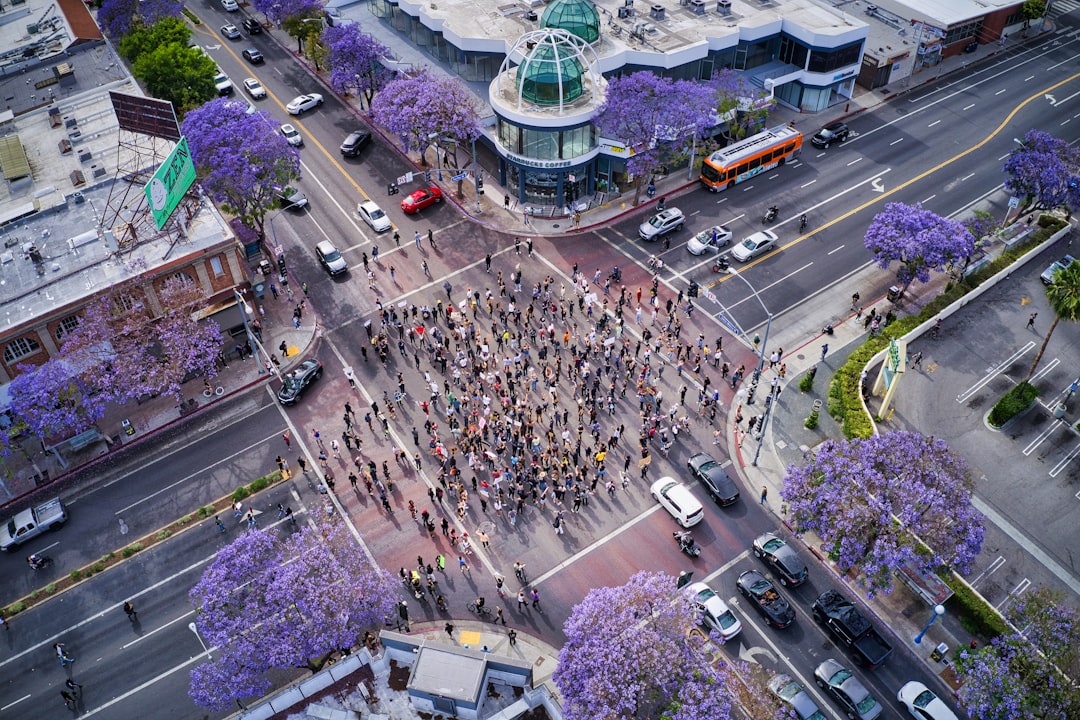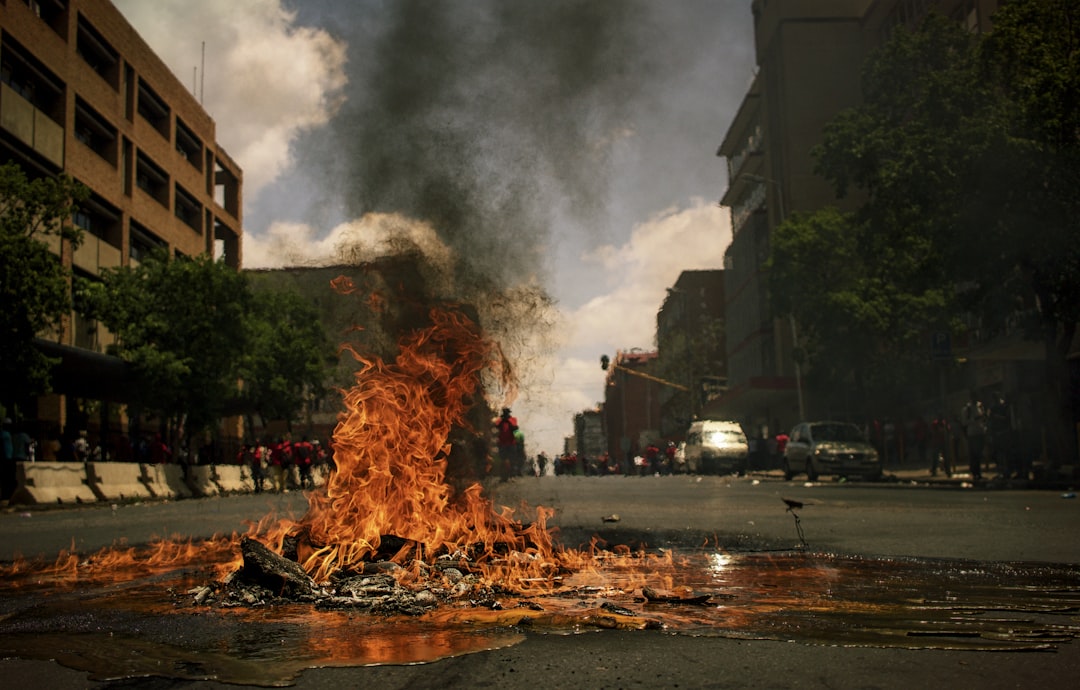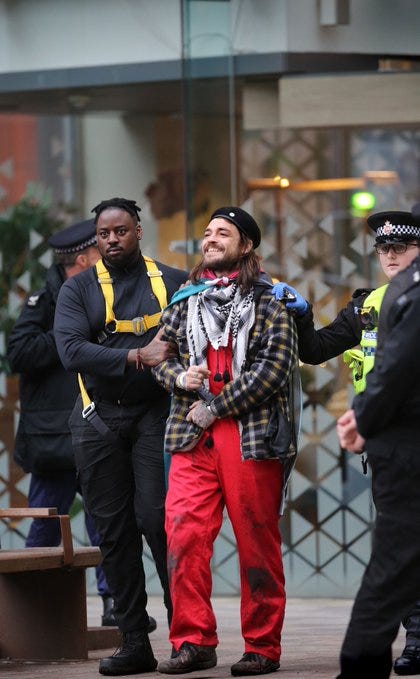Does Your Life Have Meaning?
The struggle for a better world, transformation, and purpose.
There’s an image stuck in my mind. It’s been lodged there for days. A man is smiling, beaming even. He’s radiant – and he’s getting arrested. On one side is private security, on the other a police officer, and he is being taken away for helping shut down production at an Elbit Systems plant in the UK. Elbit is an Israeli-owned tech and weapons manufacturer that I’ve written about before because it's become a major target for protesters attempting to slow and ultimately shut down the war machine that feeds Israel’s attack on Gaza. But in the middle of this crisis that has reverberated across the world, one man is smiling, beaming, thrilled to have played a small part in hampering a genocide, even for a moment.
This scene is repeating itself again and again across the globe. Crowds chanting and cheering as they shut down bridges, factories, malls. Groups and individuals filled with immense sadness, and yet overwhelmed with purpose and a form of joy as they finally feel able to do something, to act in a meaningful way amid all the horror. And this isn’t new. One of the most important memories I have of summer and fall 2020, as well as after certain protest actions since that time, is people gathering outside of New York City central bookings, the jail most people are taken to after civil disobedience actions or arrests at rallies and marches, and cheering each time anyone emerges, free. The crowd at central bookings doesn’t just hang out on the street next to the jail, we’re often waiting with food, drinks, a jacket, whatever we think those inside might need. In those hours of jail support there is such intense solidarity, such clarity about being there to support those unjustly arrested for their activism, there is such a sense of purpose.
The feeling of meaning and mission that comes with taking important action as a collective is likely as old as our species. In this current moment, masses of people are gravitating towards the purposefulness that comes with resistance for a specific set of reasons. The most obvious is the extent of Israel’s attack on Gaza, the number of civilian causalities, and the way we constantly see footage of these dead and injured children in particular. Plus we are all increasingly aware that countries are complicit in this whole horrific enterprise. But what’s less noticeable, on the surface, is the ways that society was primed for this moment. So many people were and are looking for meaning and purpose in a society where so many of us are so divorced from these fundamental drivers of life.

Everyone wants purpose. Everyone wants life to feel meaningful, significant, important in some way. The most fundamental purpose is survival, and as we are seeing with painful clarity that is not always assured. But when the daily fight for survival is less present, less necessary, a range of alternatives emerge. For hundreds of years in the West it was Christianity, for a sizable chunk of the population. The church provided, for many, a clarity of purpose. For others (including plenty who professed strong religious beliefs) greed or success were their primary drivers, lending a sense of purpose and meaning to life. Perhaps for still others it was exploration or conquest or community. Indeed for a whole lot of people, even when survival is assured, caring for others, for family or neighbors or those in need, becomes the most significant thing you can do with your life.
In the past century, several things have shifted. First came a gradual shift away from religion, for millions. And many who are still religious today believe less in religion’s answers to existential questions. Of course there are also millions who have adopted evangelical beliefs or other paths that accept and embrace fundamentalist religious answers to life’s most difficult questions. But these folks also face the problems caused by capitalism’s encroachment into all areas of our lives, and its declining power to meet many of our needs. Often we’ve been taught to think of the economic as distinct from the spiritual, the emotional, the existential, but the truth is that the way our economic system has shaped our lives, from the political to the social, is inescapable. And it’s had profound effects on many of the places we look to for meaning in life.
Some of these repercussions are quite straightforward. For years I lived in Iowa and Missouri, and I would drive between the two several times a year. Along the way I would see countless towns that had been passed over by this extractive and uncaring capitalist system. The awnings on the stores hadn’t been updated in decades, main streets were littered with closed shops, and a lot of these towns used to have twice as many people as they do today. More recently it was Kansas, driving through on the road trip I mentioned to you. The national media often talks about the struggling economies of these states, and their rural areas, but rarely are the existential ramifications clearly spelled out. If we aren’t present in these towns we can’t often see how industrial agriculture, the timber business, or mining companies destroy the hearts of communities across the country. When the corporations that have from the outset been established to extract as much profit as possible, including cutting as many jobs as possible, move on, thousands and thousands of people are left in the lurch.
This destroys community. It is not that nothing remains, most of the time. There are ghost towns out there, but more often when you pass through you see a community that is a shell of its former self. In cities, the decimation or weakening of communities has taken a different form: white flight, the hollowing out of urban centers, urban renewal, suburb-ification. In countless American cities the ability to live in the midst of a healthy neighborhood has decreased dramatically, and with that comes fewer relationships with neighbors, fewer bonds of care, and therefore less ability to help one another and pursue one of the most meaningful elements of human existence. We are more spread out from family, from our places of origin. We are told to find meaning at work, and through consumption, but it should go without saying that being a consumer is no place to look for purpose. This effort leads to little but emptiness, no matter how often it is drilled into our heads and held up as a model for us to pursue.
Layered on top of the hollowness many people find in being told that our sense of self should be tied to jobs or material goods and the difficulty so many of us feel in less communal lives is the general disillusion with modernity. Intimately connected with the decline of capitalism, more and more people feel they were lied to about the American Dream, about the ability to thrive simply by working hard and following the rules of the game. On a more philosophical plane, people feel as though this society may not in fact be headed anywhere. So not only are they disillusioned about the possibilities for individual prosperity and wellness, they’re disillusioned about the opportunities the future holds. Pair that with the frequent absence of faith in religion, or in any grand narrative, and you have masses of people who don’t know where to turn for purpose, for meaning in this life.
As you undoubtedly know, fascists are eagerly preying upon the disillusioned. In some cases they utilize preexisting racism, antisemitism, Islamophobia, anti-immigrant sentiment, or another prejudice. In other case the far-right largely builds the prejudice themselves, the way they’ve largely manufactured a trans panic or created a powerful and frightening misogynistic alt-right pipeline with the likes of Andrew Tate and others. As Robert Putnam puts it in his book Bowling Alone, “People divorced from community, occupation, and association are first and foremost among the supporters of extremism.” And yet this is still just a partial picture of why the right has been successful in recruiting those who are isolated and lacking in opportunity.

The repression and weakness of the left, from the red scare and the suppression of socialists, communists, and Black radicals, to the attack on unions and the decline of the labor movement since the ‘80s, all removed an avenue for those looking for community and meaning. Over the years there have been plenty of people who pursued left politics regardless, but in recent years, since 2020 but also in the Trump years and before, we’ve seen a surge of interest and numbers in left organizing that centers community and connection. The creation and strengthening of organizations, the creation of bonds among workers in the form of unions, the wave of mutual aid during the first two years of the pandemic, all of it has had a central element of community building. And in this work, this organizing, so many people are finding the meaning and purpose they’ve spent much of their lives searching for, but never before found.
I should say much of our lives. I was purposeless, drifting, for a few years there I just wanted to feel good 24/7 and that was about it. There was a desire for something more profound but I had no idea how to find the meaning I sought. And it wasn’t as if one day I suddenly found organizing and community and turned my life around, but in the last several years as I’ve become more politically active, more engaged in the labor movement and mutual aid and other causes, life has grown more meaningful. I could and will write so much more on this topic, but suffice it to say that realizing my liberation is bound up with yours, realizing that in helping you I help myself, realizing that lofty ideals mean nothing without action, all of this has given me a profound purpose. Well before I became engaged in community and workplace organizing I intellectually believed that my happiness is connected to yours. I was aware of what one mentor of mine calls “enlightened self-interest” where I know that extending my hand to you comes back around to me. But then I started to live it, slowly and haltingly and imperfectly. And it was in trying, struggling to live it out that life took on a new glow, a new dimension, a new worth. I had meaning and purpose right here, tangible, vital.
What we see today all around us is countless people experiencing this change. You may or may not be going through this transformation yourself, I don’t know. And if you’re not maybe this partial articulation I’ve provided here doesn’t make much sense. But, if you look around, or even think about what you’re seeing around you today, I bet you feel it. I bet you know somehow that this type of change is in the air. Times are getting tougher in some ways and yet people are responding by throwing themselves into community building, throwing themselves into organizing, into the push for the transformation of society. Sometimes that can be annoying, or disruptive, or difficult, but the result is often beautiful as well, in time. As George Jackson implored, “Discover your humanity and your love in revolution.” Che also talked about how “the true revolutionary is guided by a great feeling of love.” Both of these sentiments hold the same fundamental truth.
We are here to care for each other, through small acts but also through creating a better society. That society we can hopefully build up together is the ultimate vehicle for us to care for one another and create a world where we all can thrive. That aim is a beautiful purpose, a noble purpose, and one that more and more people are finding in this crucial moment. And we are just beginning. A wave is growing, a wave of change and profound meaning and transformation. It must keep building urgently but also with deep roots so that the result is both truly radical, in that it must get down to the roots of our current ills, and sustainable, meaning we have replacements for the existing systems that can last and enable us to survive the trials ahead. I think if we look around we see the seeds being planted and the momentum starting to grow. We also see a backlash, but one that can be overcome with thoughtful, thorough, and dedicated work. So now is the time, the time to find love in community, in working towards a better world, in a life filled with purpose and meaning. I look forward to being a small part of this change, together with you. Onward.



Thank you for this. It’s so invigorating to read and feel this surge of love and connection amidst such alienation and suffering. Thank you for the clarity of your reminder that such is possible, and necessary. Much love.
Thanks for articulating such an important observation. Connection, community and activism give our lives so much meaning.
"George Jackson implored, “Discover your humanity and your love in revolution.” Che also talked about how “the true revolutionary is guided by a great feeling of love.” Both of these sentiments hold the same fundamental truth."